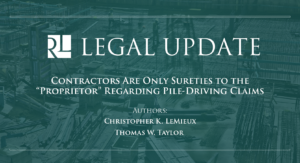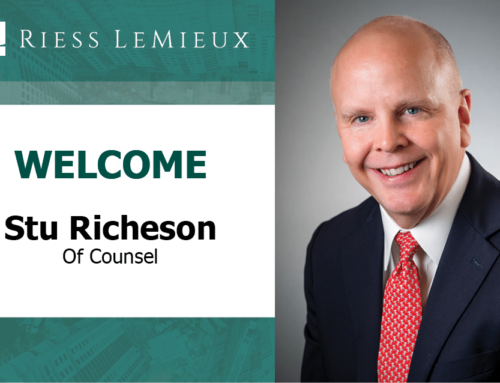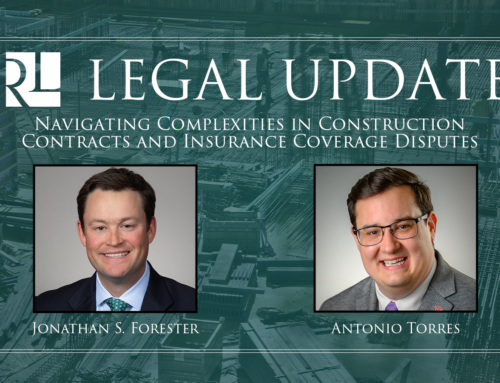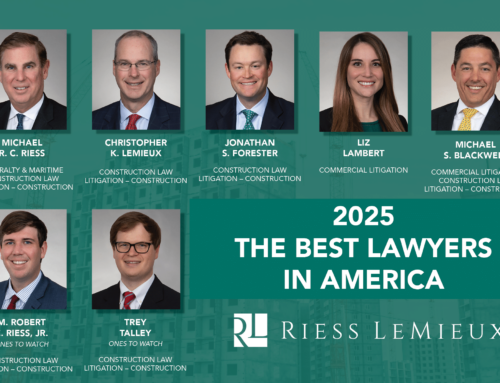 Calvin J. Hill, Individually and as the Executor of the Succession of Elnora Johnson Hill v. TMR Exploration, Inc., Park Exploration, Inc., and Vitol Resources, Inc. 2022-0744 (La. App. 1 Cir. 12/19/2023) 2023 WL 8742973:
Calvin J. Hill, Individually and as the Executor of the Succession of Elnora Johnson Hill v. TMR Exploration, Inc., Park Exploration, Inc., and Vitol Resources, Inc. 2022-0744 (La. App. 1 Cir. 12/19/2023) 2023 WL 8742973:
Under La. R.S. 9:2773, Contractors Are Only Sureties to the “Proprietor” Regarding Pile-Driving Claims.
Authors: Christopher K. LeMieux and Thomas W. Taylor
Hill v. TMR Exploration, Inc., provides crucial insights into legal challenges arising from subsurface trespass claims during oil well drilling. This case underscores the need for contractors in the oil and gas industry, especially those operating in Louisiana, to carefully define their duties, understand statutory limitations, and consider potential suretyship obligations.
The case involves a claim for subsurface trespass arising from the drilling of an oil well on a 22-acre tract of property in Baton Rouge, Louisiana (“the Hill property”). TMR Exploration, Inc.
(“TMR”) entered into an oil and gas mineral lease with A. Wilbert’s Sons, LLC (“the Wilberts”) to drill a well on the Wilberts’ property located adjacent to the Hill property. TMR enlisted Schlumberger Technology Corporation’s (“Schlumberger”) services to guide drilling. With TMR’s direction, Schlumberger drilled the well. Subsequently, Halliburton Energy Services, Inc (“Halliburton”) was engaged by TMR for fracking operations in support of the drilling project. Although TMR obtained a permit to directionally drill the well, the well also contained a horizontal component, allegedly causing the bottom hole of the well to trespass beneath the Hill property almost two miles beneath the surface.
Consequently, the Hills initiated legal action against TMR, Schlumberger, Haliburton, among others, claiming that TMR’s drilling operations caused damage to their property, seeking damages for minerals produced. The Hills specifically alleged subsurface trespass, liability under Louisiana Civil Code Article 667 (“La CC Art. 667”), and general negligence against Schlumberger and Halliburton. The Hills contended that the defendants should have foreseen damages from directional drilling, completion, and fracking in violation of state regulations.
La CC Art. 667 governs the limitations on the use of one’s property in relation to the property of his neighbor. Under La CC Art. 667, a property owner or proprietor can be held liable for damage that he causes to the property of his neighbor through works performed on his own property, upon a showing that he knew or, in the exercise of reasonable care, should have known that his works would cause damage, that the damage could have been prevented by the exercise of reasonable care, and that he failed to exercise such reasonable care.
In response to the lawsuit, Halliburton filed a motion for summary judgment, contending that it bore no duty to safeguard against subsurface trespass and was not a “proprietor” under Article 667. The trial court granted summary judgment, relieving Halliburton of responsibility for the trespass and absolving it of any duty owed to the Hills. Similarly, Schlumberger filed a motion for summary judgment, asserting that it had relied on information provided by TMR and was not a “proprietor” under La. C.C. Art.667.
For the purposes of this legal analysis, only the procedural posture of Schlumberger’s motion for summary judgment is discussed.
The trial court granted Schlumberger’s motion, reasoning that, as a contractor, it owed no duty to the Hills and was not responsible for the trespass. The court underscored Schlumberger’s role as working under TMR’s direction and emphasized its lack of obligation to explore or examine the well’s location. Furthermore, the court concluded that Schlumberger’s liability, if any, would be confined to that of a surety under Louisiana’s Revised Statute 9:2773(a), which as a matter of public policy, limits the responsibility of contractors to act as sureties for property owners under La. CC Art. 667. If the property owner is held responsible for damages to a neighbor due to the contractor’s work and cannot satisfy the claim, the contractor, acting as a surety, may seek reimbursement from the property owner for any damages, costs, loss, or expense incurred.
Unsatisfied with the trial court’s decision regarding Schlumberger, the Hills appealed the trial court’s decision, contending that Schlumberger did, in fact, owe a duty of care to them and that the trial court erred in its finding that Schlumberger was not responsible for any trespass merely because Schlumberger relied on TMR’s information and direction.
The appellate court affirmed in part and reversed in part the trial court’s decision to grant summary judgment for Schlumberger. It concurred with the trial court’s dismissal of claims against Schlumberger as a principal, finding no evidence of negligence on Schlumberger’s part. However, the court diverged from the trial court’s decision to completely dismiss based on La. R.S. 9:2773. It held that Schlumberger’s potential liability as a surety of TMR remained. Consequently, the court reversed the summary judgment to the extent it dismissed the claim against Schlumberger as surety under La. R.S. 9:2773. Simultaneously, the court affirmed the dismissal of claims against Schlumberger as a principal and remanded the case for further proceedings consistent with its opinion.
The implications of this case for contractors engaged in activities that may impact neighboring properties, particularly in the realm of oil and gas exploration, are significant. This ruling highlights the importance of clearly defining the scope of a contractor’s duties under the contract and incorporating language that elucidates responsibilities and limitations. Additionally, the decision emphasizes the necessity for contractors to be cognizant of state statutes that may influence their liability, such as La. R.S. 9:2773, and underscores the need for contractors conducting business in Louisiana to consider potential suretyship obligations. Staying informed about changes in relevant statutes and legal interpretations is crucial, as evidenced by the court’s consideration of statutory amendments impacting liability considerations.



